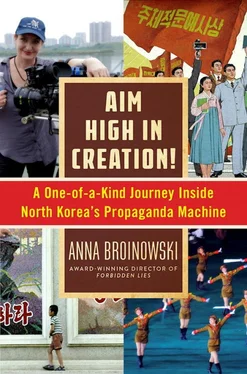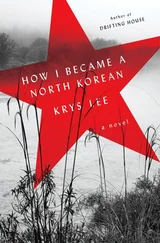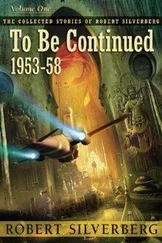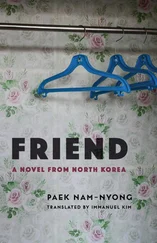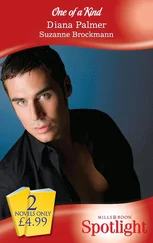Yurim unfolds his long legs and stands. He is painfully shy. He smiles and ushers us to our seats. We bow and shake hands with the leading lights of the North Korean film industry, all over fifty. Mr. Pak is short and suave, with magnificent white hair. He is the North Korean Scorsese—known for searing political thrillers. Mr. Ri is scruffy and blunt, built like a wrestler. He directs military-action pictures: the North Korean Oliver Stone. Next is a composer with a high forehead and bright eyes, Mr. Pei. For his music on the drama My Happiness , Kim Jong Il made Pei a People’s Artist—the North Korean equivalent of winning an Oscar. Last to greet us is Ms. Yun, an ageless, soft-skinned beauty. Despite the heat, she’s wearing a lacy suit and thick white stockings. Ms. Yun is also a People’s Artist: the North Korean Meryl Streep. She blushes, as shy as Yurim.
Lizzette spreads some Guylian pralines on a low table, which the filmmakers politely refuse. There is a dignity, and a sharp intelligence, behind their pleasantries. They watch closely as I pull Kim Jong Il’s The Cinema and Directing from my handbag. I can sense their quiet approval that the book is well thumbed. Nervous, and speaking slowly so Eun can translate, I begin: “Thank you for having us. I am here because I have a problem in my country. Many companies are coming from overseas. They are drilling for gas and destroying our land.”
The filmmakers nod but say nothing. I continue: “I want to make a documentary, in which you instruct my actors and me how to follow your General Kim Jong Il’s filmmaking rules. Our goal is to produce, at the end of the documentary, a ten-minute drama, in which a humble Sydney gardener inspires her village to stop the evil miners destroying her park.” I smile at them hopefully: “I don’t know enough about your films to write the script. I need your help!”
Silence. The filmmakers look at me, poker-faced. No one moves. At the back of the room, a man in a black Mao suit has entered. He sits next to Ms. K, takes a gold pen from his pocket, and gazes blankly at the wall. Clearly, I’m not going to get a response from him either. The silence stretches on. I keep smiling, until my jaw hurts. Finally, Mr. Pak takes a long drag on his cigarette and exhales. He says something quietly to Eun, and everyone giggles. She turns to me: “Senior Comrade Pak says you used to be an actor. But you were stiff as a stick. So now you direct.”
I look at Ms. K. She’s chuckling behind her hand. Clearly, the self-deprecating remarks I made to her on Skype in Beijing got through North Korea’s firewall. I grin bravely at Mr. Pak: “I am not a good director either, when it comes to making a film in your style. Your General Kim Jong Il says one must ‘aim high in creation’ when choosing the seed. But I am not sure what my seed is…”
Mr. Pak cuts me off, speaking directly to Eun. “Tell her this: with plants, you need good-quality seeds to bear good-quality fruit.” Eun obliges, and he warms to his theme: “With animals too, good breeding produces superior beasts. In filmmaking, the seed is what the creators want to say. It’s the nucleus of the film. She doesn’t know what her seed is, because she’s trying to do too much. Her documentary is already complex—but on top of that, she wants to fit her gardener drama into ten minutes. It’s too ambitious.”
Mr. Pei nods gloomily. Mr. Ri slumps in his chair, overwhelmed by the impossibility of my task: “Yep, it’s way too ambitious.” I look at Lizzette, stymied. This is worse than pitching to the ABC. The North Koreans are the epitome of artistic ambition: they produced thousand-actor extravaganzas like Sea of Blood at Chollima speed. How can they be daunted by my little film? Then I remember that Sea of Blood is three hours long. Lizzette comes to the rescue, smiling graciously at Mr. Pak: “In our country, it is very expensive to make a drama. We must hire a proper crew and pay the actors high wages. We cannot fund anything longer than ten minutes.”
The filmmakers stare at her, mystified. There is no such thing as a producer in North Korea. What does Lizzette do? “I go to investors, asking for money,” she explains. “Then I visit set every day, to make sure the director is getting everything shot on time. After that, I work with distributors to get the film shown.” Mr. Pak nods: “Ah. You’re like him.” He points at the Man in Black, a little dismissively: “He follows our progress, on behalf of our beloved Party. We’re funded by the state, so we are free to create. We don’t have to worry about money, or do what investors tell us. That sort of thing must never, can never, and will never happen in our country.” He leans back, satisfied—and lights another fag.
Lizzette and the Man in Black exchange a wary look across the chasm between them: the Western producer with whom the buck stops, and the North Korean Party official, an ideological rubber stamp for films green-lit by Kim Jong Il. I wonder who approves Mr. Pak’s budgets now, with the sports-focused Kim Jong Un in charge. Someone must: Mr. Pak has just come from the seaside city of Wonsan, where he’s making a film about a coal miner. Our request to visit his set has already been met with a flat no from Ms. K: the mine is “too dangerous” for us to enter. I suspect the real reason is that Mr. Pak’s cast of miners is real, and Ms. K doesn’t want us seeing the conditions in which they work.
I turn to Mr. Pei, hoping he’ll be more collaborative. Composers have to be, unlike directors; it’s part of their job. “I know you’ve written many number-one songs,” I say. “We hope you will do us the honour of writing a song for our drama.” He nods enthusiastically: “I’d love to. You must hear my work, before you go.” But Mr. Pak ashes his fag, shooting Mr. Pei a dark look: “We will decide if we can help her, if and when she sends us a script.”
Everyone nods and clams up again. At the back of the room, the Man in Black scrawls something with his gold pen. I realise why Mr. Pak is being so cagey: Lizzette and I are not the only ones being monitored. He flips up his cuff and looks pointedly at a seventies Rolex. I hold his gaze. It’s a Confucian power play; as the respected elder, Mr. Pak has final say. I have a nightmarish flash of myself back in Sydney, trying to write a Kim Jong Il–style script that will earn this patriarch’s approval. Even if I email it to Nick to give to Ms. K, there’s no guarantee it will get to Mr. Pak. And if it does, and he likes it, the Man in Black might not. I need to win Mr. Pak over now, in front of his colleagues, or our project is kaput.
Mr. Pak pops a praline into his mouth, thoroughly bored. I look at Eun, desperate, but she avoids my eyes. We all sit there, listening to Mr. Pak chew. Then, from the back of the room, Ms. K speaks up: “Anna, did you know our Dear Leader General Kim Jong Il once called Senior Comrade Pak ‘the white-haired director’? After that, he never dyed his hair again.” Bingo! Mr. Pak is the director who searched all night for the missing twenty-three frames! I feel as if George Clooney just walked into my cafe—here, in front of me, is Kim Jong Il’s favourite filmmaker. Ms. K has thrown me a lifeline: I haven’t been treating Mr. Pak with the respect he deserves. I shoot her a grateful look, and turn to him with new reverence: “I understand, Senior Comrade Pak, that you worked closely with your Dear Leader Kim Jong Il, on over seventy films…”
Mr. Pak immediately relaxes and beams, a different man: “Our Dear Leader was someone who, once he placed faith in you, trusted you till the end. The fact he remembered me, even in his dreams, is the greatest honour anyone can receive.” He picks up my copy of Kim’s manifesto, taking care not to cover the Leader’s name with his hand: “This book is a weapon for filmmakers in our country. Every time I make a new film, I go over the Dear Leader’s words again, to see if I’ve strayed from the right path. When I was arrogant, he taught me to see the error of my ways. It is all thanks to him that our film industry made great strides, and our nation is strong.” The filmmakers nod happily, and Mr. Pak glows with pride: “We might be a small country, but no one can look down on us because we have nuclear weapons. We’ve even launched satellites into space. All of this is thanks to the Dear Leader, who, with his iron-like will and great passion, gave his whole life and body to achieve it. That’s why we still mourn him, and the agony of his loss remains un-erased in us to this day.”
Читать дальше
